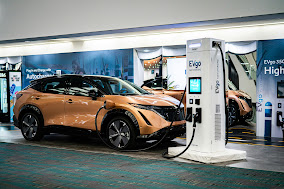 |
| EV charging gas stations may not be a win for rural areas. (Photo by Oxana Melis, Unsplash) |
While the infrastructure development may be a positive for EV vehicle owners and gas stations, program restrictions and complex application processes can limit rural participation. "Because the National Electric Vehicle Infrastructure program rules require proximity to the highway and sites that operate 24/7, they could lead to EV drivers not stopping and spending money in rural downtowns, which are sleepy at night and distant from turnoffs," Ferris explains. "The extensive application processes that states have put in place to win the money may also create barriers to small-business owners, including mom-and-pop gas stations and convenience stores."
When EV charging stations first entered the energy market, fueling station owners pushed against the change, but the hybrid of both is gaining traction. "After initially resisting EVs and their charging needs, fueling centers are now using their lobbying strength and financial might to win federal dollars," Ferris writes. "Service stations have the upper hand in this first wave of subsidies because they occupy the very real estate where the federal government wants to build a charging backbone: at 50-mile intervals along the interstates and no more than a mile from highway exits."
Considering the cost and complexity of gaining NEVI funds, it's not surprising that "two of the nation's biggest truck stop chains, Love's and Pilot Flying J, are slated to host 39 charging plazas," Ferris reports. "As bidders, truck stops and gas station chains won $92.1 million, out of a total of $265 million awarded by the infrastructure law to date, according to the EVAdoption data. Gas stations and trucks stops together are hosts for almost 54 percent of NEVI-funded charging stalls."
No comments:
Post a Comment